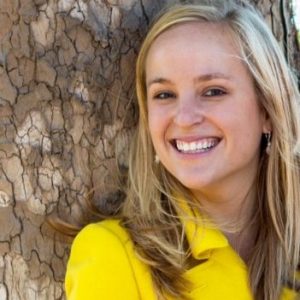Empowered Women Empower Women (III)
By: Allison Mihalich
January 15, 2018

[As a graduate student in Virginia Tech’s Executive Master of Natural Resources (XMNR) degree program, Allison Mihalich participated in an International Residency trip to India. In Part I and Part II of this four-part series, Mihalich discusses the importance of empowering women of the Thar Desert region, and the story of how the Jal Bhagirathi Foundation originated.]
Profiles of Empowered Women
The Executive Force
Kanupriya Harish, Executive Director and Trustee of the Jal Bhagirathi Foundation (JBF) works hard to maximize the organization’s impact on the villages. Harish has worked in support of the JBF since 2004 when she heard about the organization while completing her Master of Philosophy studies at Jawaharlal Nehru University in New Delhi and Sustainable Environmental Management at University of California, Berkeley.
The JBF empowered her to tackle a variety of positions within it. Harish was appointed Project Director in 2007 and Trustee in 2009, eventually appointed as Executive Director in 2014. She is still the head of the organization, responsible for overseeing projects implemented across 450 villages.
Upon first her, it is evident that direction, alignment, and commitment are stressed throughout the organization’s culture and policies. Harish ensures that addressing “safe water and sanitation, women’s empowerment, rural livelihoods, and advocating for policy reform ensures that pro-poor concerns are integrated in policy formulation.” (Jal Bhagirathi Foundation, 2016).
Fieldwork can be particularly strenuous due to the extreme conditions of this region and is further made worse by lack of nearby facilities. In talking about her own experiences, Harish explains that women should be tougher. Harish mentions the joy she gets from “gallivanting” out in the field and prefers to spend her time learning from the villagers firsthand, and seeing the issues. She likes going alone and often brings candies for the children to share her good will. Conducting village visits with minimal to no support staff ensures villagers understand her willingness to spend time listening to their concerns.
Harish took a team from Wells for India, a partner organization, to a Janadesar village in Jodhpur to monitor progress on behalf of a donor that supported a sanitation project in the area. Once the meeting was completed, a woman took her aside and whispered, “It is because of you that our lives have changed” (Rakesh, 2013). This type of response is frequent, with many villagers’ lives dramatically improving from the dedication of Harish and her staff.
Many of these villagers go on to further support their villages by utilizing the Jal Sabha and Jal Mandal platforms encouraged by the JBF, thus identifying and addressing further issues facing the women and villages.

Program Specialist
Amita Dahiya is a fresh face at the JBF, having recently accepted the position of Program Specialist at headquarters.
Dahiya’s background is in education, youth, program monitoring, and financial tracking. Dahiya applied for the position because of her interests in water issues, and moved to Jodhpur to take on the role to support the JBF at the community level. She stressed the importance of brushing up on all of the JBF’s initiatives and strategies.
The JBF emphasizes training for all its new employees. By focusing on training, the JBF invests not only in the success of its mission and vision, but also in staff development.
[In Part IV of this four-part series, available on January 22nd, Mihalich offers another profile of empowered women in India’s Thar Desert Region, as well as a review of results and future steps.]
---

Allison Mihalich is a graduate of Virginia Tech’s Executive Master of Natural Resources program, and an analyst at the U.S. Environment Protection Agency (USEPA). Some key responsibilities include supporting the development of USEPA’s strategic plan, implementing USEPA’s Cross-Agency Strategies aimed at improving sustainability, community-based work, building partnerships, and working as a high performing organization. Allison has also worked as a performance analyst specializing in Air issues and as a budget analyst. Allison lives with her husband and dog in Falls Church, Virginia.
References
- About Us JBF. Retrieved from http://jalbhagirathi.org/about.php
- Community Water Management: A Strategy for Adaptation to Climate Change. Jal Bhagirathi Foundation. Retrieved from http://jalbhagirathi.org/themes/upload/document/876458.pdf
- Ghosh, S. Talabs of empowerment: How the women of Rampura freed their daughters from the burden of the idanis. May 4, 2012. Retrieved December 17, 2016, from http://www.thealternative.in/society/jal-bhagirathi-foundation-talabs-of-empowerment/
- Milestones, Jal Bhagirathi Foundation. Retrieved from http://jalbhagirathi.org/themes/upload/document/838171.pdf
- Moment for Action. Retrieved from http://ms.tcktcktck.net/proto/hero-19/
- Rakesh, R. (2013, May 13). Women take the lead to create water sources in Rajasthan. Retrieved February 06, 2017, from http://www.theweekendleader.com/Resilience/1607/sourcing-water.html
- Sustainable Development Goal 5: Gender equality. (n.d.). Retrieved January 30, 2017, from http://www.unwomen.org/en/news/in-focus/women-and-the-sdgs/sdg-5-gender-equality#sthash.TuGbId32.dpuf
- UNDP. (2010). Good Practices in Water Security: Ideas for Praxis. Retrieved from http://www.undp.org/content/dam/india/docs/good_practices_in_water_security_ideas_for_praxis.pdf
- Voice and Agency: Empowering Women and Girls for Shared Prosperity. World Bank. October 10, 2014. Retrieved from http://www.worldbank.org/en/topic/gender/publication/voice-and-agency-empowering-women-and-girls-for-shared-prosperity
- Women’s Empowerment Principles. UN Women. Retrieved December 17, 2016, from http://www.unwomen.org/en/partnerships/businesses-and-foundations/womens-empowerment-principles


